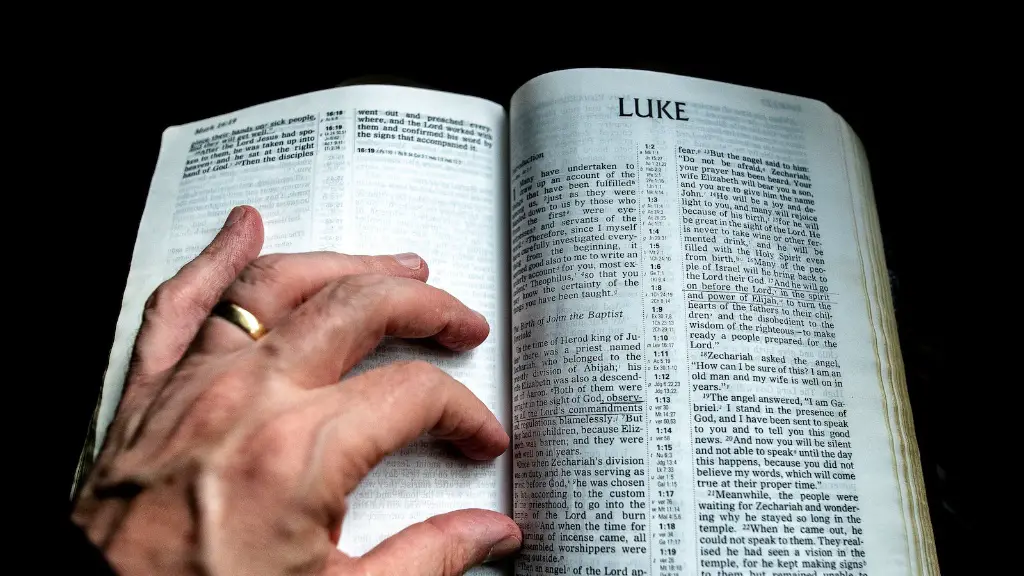The Biblical Cause Of The Flood
According to the biblical account, the flood was a result of God’s wrath. God was displeased with the corruption, wickedness and violence of the world and so decided to flood the earth. This is why readers of the Bible often refer to the flood as the ‘Great Deluge’. The scriptures state that the flood was a result of God’s anger. It was a punishment for the wickedness that had spread throughout the land. In the story, God told Noah to build an ark to save his family, and all of the creatures on board the ark would be spared from the flood.
On the other hand, some people argue that God flooded the earth as a way to cleanse the world of its sinful nature. This argument is based on the belief that God wanted to rid the world of its wickedness and create a new start for humanity. By destroying the world and all of its inhabitants, God was able to provide a fresh start for new generations to come. The scriptures do not provide much evidence for this argument, but some believers see the flood as an example of God’s willingness to forgive and create a new life for his people.
The Scientific Perspective
The scientific community has offered a few theories to explain the biblical flood. One popular hypothesis is that a meteor shower caused the flooding. It is believed that an asteroid or comet hit Earth, sending a gigantic wave of water that spread rapidly across the land. This could be seen as an act of divine wrath. Another theory that is often discussed is that the flood was the result of a global climate event. The Bible mentions that the mountains of Ararat were covered with water. This could be connected to a massive global warming event, which could have caused a sudden and unexpected weather change around the region.
Regardless of the scientific theories, many theologians believe that the flood was an act of God. They argue that human cause and effect are insignificant in the grand scheme of God’s plan for mankind. Moreover, many religious scholars believe that God used the flood to wipe the slate clean after a period of wickedness had caused chaos. They argue that God was trying to bring humanity back to its original purity, and so flooded the earth in order to restore it to its original state.
The Causes Of The Flood
From a biblical perspective, the reasons for the flood are made clear. The Book of Genesis states that God flooded the world because of the wickedness that had spread across the land. This wickedness reached a point where it was ‘unclean’ and had to be ‘washed away’. This could suggest that there was an emphasis on the purification of mankind before new generations could be born.
On the other hand, some people suggest that the flood was not a punishment for wickedness but rather a way for God to restore balance to the world. They argue that the world had become chaotic and unbalanced, and that God flooded the world as a way to restore harmony. The idea of balance is often mentioned in the Bible, and this could suggest that the flood was a way for God to restore balance to the world.
Do We Receive Warnings BeforeGod’s Disasters?
The Bible makes it clear that God gives warnings before He brings forth disasters. In the story of the flood, God warned Noah to build an ark as a way to save himself and his family from the imminent destruction. This is an example of God’s mercy in not simply striking without warning.
Modern day natural disasters, like hurricanes, earthquakes and floods are often accompanied by warning signs. These warning signs can help people prepare for the disasters and save lives. In many ways, these warnings can be seen as ‘modern-day Noahs’. By paying attention to the warning signs that God provides, people can be ready for and survive disasters.
Can Disaster Be Avoided With Faith
The Bible also tells us that faith can be used to avoid disaster. For example, in the story of the flood, Noah and his family were spared from destruction because of their faith in God. This suggests that faith can be seen as a form of protection from disasters.
In modern times, faith can still be seen as a form of protection from disasters. For example, many believe that people of faith are less likely to be victims of disasters because they have faith that God will provide protection. Thus, faith can be seen as a powerful tool in times of hazard and disaster.
How Does The Flood Relate To Our Life Today
The story of the flood is not just a story of the past but a story of the present. It can remind us that we are all interconnected in the grand scheme of God’s plan. It can remind us that we should not take this life for granted. Just as God judges the wicked in the story of the flood, He judges our actions today. Therefore, the story of the flood can both warn us and remind us to strive for righteousness in our own lives.
The story of the flood can also remind us that even the most wicked people can receive mercy from God. In the story of the flood, God offered mercy to Noah and his family, even when the world around them was drowning in wickedness. This can encourage us to remember that no matter how bad our circumstances may seem, we can always find hope and mercy in God.
How The Flood Reshaped The World
The Flood reshaped the world in more ways than one. It caused large-scale destruction, of course, but it also gave us a glimpse of a new world order. After the Flood, God commanded humans to repopulate the world and to live according to His laws. This was a departure from the way in which the world operated before the flood, with wickedness and corruption being rampant. It was a new beginning for the world and for humanity, where laws were put in place to ensure justice and order.
Furthermore, the Flood serves as a reminder of the importance of God’s law. The Bible states that only those who accepted God’s law of righteousness and justice would be spared from the Flood. This serves as a reminder that we should strive to live by God’s laws as much as possible, in order to avoid disaster. Finally, the Flood reminds us of the hope and mercy of God, which is always available to us, even in our darkest times.
The Overall Impact On Humanity
The Flood was a significant event in human history and had a major influence on humanity. The Flood reshaped the world by introducing a new system of laws, as well as giving us a reminder of God’s mercy and justice. Additionally, it serves as a warning to us all that wickedness and corruption can be punished by God, and it is our responsibility to live according to His will. The Flood is also a reminder that, even in the darkest of times, there is hope, and God will provide us with mercy and protection.
The Flood is also a reminder of the interconnectedness of humanity. The story of the Flood is not just a story of the past but a story of the present. The events of the Flood show us that we are all interconnected, and that our actions today have the potential to reshape the future. It serves as a reminder to all of us to strive for righteousness and justice, and to have faith that God will always provide us with protection, hope and mercy.
The Significance Of The Ark
The ark is a significant symbol in the story of the Flood and one that is often remembered. The ark served as a form of protection for Noah and his family from the Flood, but it is also symbolic of God’s mercy and protection. In the story of the Flood, God instructed Noah to build an ark to save his family. This is a clear example of God’s mercy and protection, and a reminder that even in the darkest of times, we can always turn to Him for protection.
The ark is also symbolic of the ‘new’ world that was created after the Flood. After the Flood, the world was wiped clean of its wickedness, and a new world order was put in place. The ark serves as a symbol of this new world, and serves as a reminder of the hope and protection that comes with believing in God.
The ark is also symbolic of the interconnectedness of humanity. It is a reminder that, no matter what hardships we face, we can always turn to each other for support and protection. This is a reminder that, even in the darkest of times, we can find hope and comfort in one another.




